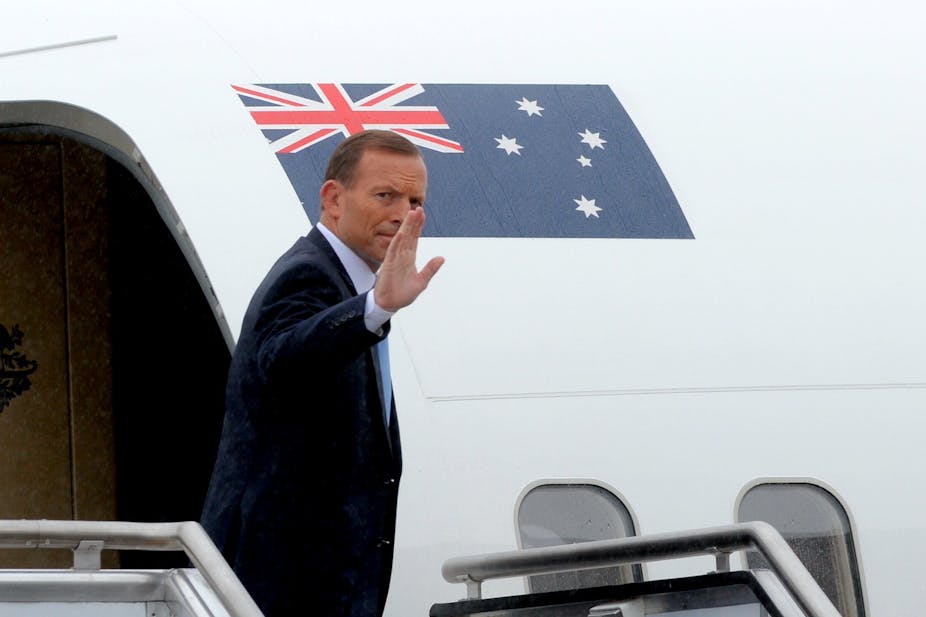Australia and South Korea are separated by geography, history and culture, but have much in common. They are democracies; their economies are open to the world; and they are allies of the United States.
Bilateral ties are expanding. Koreans are visiting Australia in record numbers and young Australians are more receptive to Korean pop culture. Despite its growing breadth and depth, however, economic issues are still the driving force in the relationship.
The politics of trade
While in Seoul, Australian prime minister Tony Abbott will sign a free trade agreement (FTA) with Korea. This pact was finalised in late 2013 and could be the spark for a “trade trifecta”. The government announced the completion of a pact with Japan on this visit, and it hopes to complete another with China by the end of 2014.
Australia’s acceptance of an “investor-state dispute settlement” clause broke a deadlock in the FTA talks with Korea. The Gillard government had opposed such clauses, which enable firms to bring disputes to an independent, international court of arbitration.
Tobacco giant Philip Morris used dispute settlement mechanisms embedded in another trade pact to take legal action against Australia’s plain packaging laws. The firm claimed that the laws had damaged its interests.
In agreeing to the dispute settlement clause, Abbott parted ways with Gillard and also the Howard government, which also had opposed the clause in trade pacts. Abbott thus reinforced his election-night claim that Australia is “once more open for business”.
Korea, as a trade-dependent economy, pursues FTAs that secure access to key markets. Australia is not a large trading partner for Korea, but it is seen as a steady supplier of agricultural and energy products.
The trade pact will expand Australian farmers’ access to Korean markets, and the Korean government has decided that compensating local farmers is a price worth paying for comprehensive trade agreements.
The Trans-Pacific Partnership question
Australia and Korea differ, however, in their views on the Trans-Pacific Partnership (TPP), a pact being discussed by 12 states.
The US is the leading force in the TPP, and argues that the region needs a standard set of rules to govern traditional forms of trade and also new issues such as intellectual property. Australia is party to the talks, but Korea has not yet joined.
The main reason for Korea’s reluctance seems to be the lack of benefits from doing so. Korea’s network of trade pacts is quite substantial and the TPP will not expand it greatly.
Staying out of the TPP could have big implications. Korea may have to settle for less favourable terms at a later date and it risks annoying the US. Despite fierce debate about the pros and cons of the TPP and RCEP, Korean leaders have yet to reach a consensus on the matter.
China has not been invited to join the talks. Japan and the US seem intent on arranging a new set of trade rules, and then trying to force China to accept those rules. The US wants its allies to support the pact. Korea, however, is attracted to the proposed Regional Comprehensive Economic Partnership (RCEP), which could result in a looser set of rules to govern trade in the region.
In any case, the TPP will not be completed before America’s mid-term elections in November.
Regional issues
Australia and Korea differ in respect to ties with Japan. Abbott has referred to Japan as “Australia’s best friend in Asia” and a “strong ally”. Japan’s reluctance to fully atone for its wartime past, meanwhile, is a strain on Korean–Japanese ties. Australia has a more benign view of Japan due its geographic, cultural and historic distance from northeast Asia.

The recent deaths of several young Koreans in Australia has created a stir in the Korean press. Korea is the third-largest source of overseas students to Australia, behind India and China. It is also a source of skilled migration.
These human links add substance to ties otherwise dominated by economic matters. Abbott will presumably assure his counterparts that Australia values its visitors from Korea.
Abbott’s talks in Korea are an opportunity to enhance bilateral ties, but challenges remain. The remarkable development of Korea’s economy is ending. Korea may be “another Japan”, but in a negative sense.
Korea’s population is ageing, its savings rate has collapsed and its firms have not invested enough in training and skills. Korea is a mature market that is no longer growing quickly. It is therefore less attractive to Australian exporters.
Australia and Korea both worry about the emergence of China as an economic and strategic power and the relative decline of the US. These long-standing allies are not likely to defect to China, but Australian and Korean views of the region may start to differ.
The two nations have a lot to learn from each other about living in what could soon become a rough neighbourhood.

